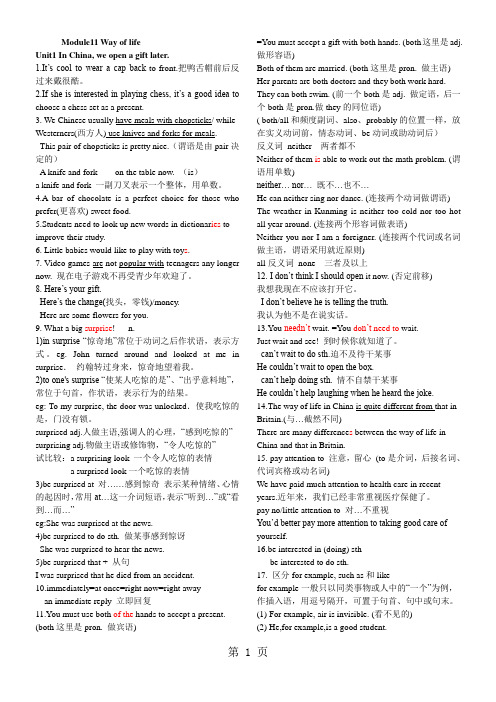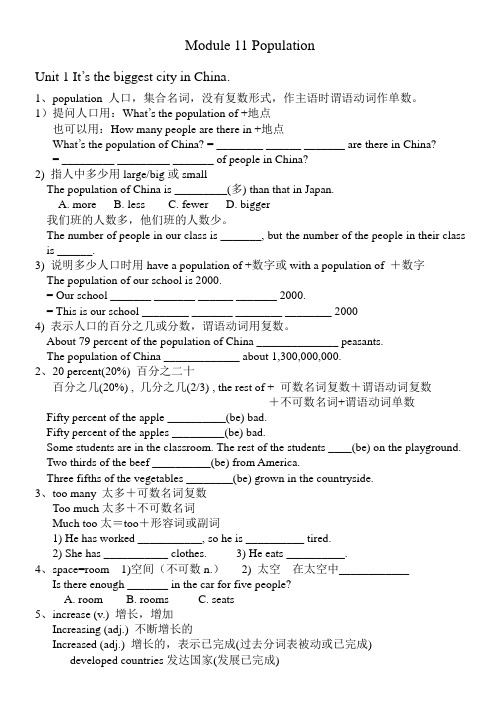Module11知识归纳
- 格式:ppt
- 大小:939.00 KB
- 文档页数:3

Module11 Way of lifeUnit1 In China, we open a gift later.1.It’s cool to wear a cap back-to-front.把鸭舌帽前后反过来戴很酷。
2.If she is interested in playing chess, it’s a good idea to choose a chess set as a present.3. We Chinese usually have meals with chopsticks/ while Westerners(西方人) use knives and forks for meals.This pair of chopsticks is pretty nice.(谓语是由pair决定的)A knife and fork ___ on the table now. (is)a knife and fork 一副刀叉表示一个整体,用单数。
4.A bar of chocolate is a perfect choice for those who prefer(更喜欢) sweet food.5.Students need to look up new words in dictionar ies to improve their study.6. Little babies would like to play with toy s.7. Video games are not popular with teenagers any longer now. 现在电子游戏不再受青少年欢迎了。
8. Here’s your gift.Here’s the change(找头,零钱)/money.Here are some flowers for you.9. What a big surprise! n.1)in surprise “惊奇地”常位于动词之后作状语,表示方式。

初二上册Module 11 Way of life词汇精讲1. surprise(1)surprise作动词时,意为“使……惊奇,使……感到意外、吃惊”。
例如:What surprised you? 什么事使你感到意外?(2)surprise作名词时,意为“吃惊,惊讶”。
这种吃惊可能包含着“高兴、害怕或忧虑”。
1)作不可数名词时,表示“惊奇,惊异”。
例如:Her face showed surprise at the news. 听到这个消息,她的脸上露出了惊奇的表情。
2)作可数名词时,表示“惊奇、惊讶、意外的事或吃惊的事”。
例如:He gave me a surprise by arriving early. 他的早到使我大感意外。
3)作名词用时还可构成短语:to one’s surprise意为“使某人吃惊的是……”。
in surprise吃惊地例如:To my surprise, he passed the exam. 使我吃惊是,他竟然通过了考试。
He looked at me in surprise. 他吃惊地望着我。
(3)surprised 是形容词,意为“吃惊的,感到惊讶的”,句子的主语通常是人。
例如:I’m surprised at the accident.我对这起事故感到很吃惊。
How surprised the students are!学生们是多么吃惊啊!【拓展】surprising也是形容词,意为“吃惊的,令人惊讶的”,常修饰物。
例如:He told me something surprising.他告诉我一些令人吃惊的事情。
2. needneed意为“需要”,常用need to do sth.意为“需要做某事”,主语由“人”来充当。
例如:Does she need to know? 她需要知道吗?He didn’t need to clean the house twice. 他无需打扫房间两次。

Module 11 Way of Life一、重点词组1、多么惊喜呀! What a surprise!2、打扫卫生do some cleaning3、注意pay attention to4、例如for example5、理发have one’s hair cut6、厄运bad luck7、你开不会是说真的吧!You can’t be serious!8、与....不同be different from9、初次for the first time10、商业大街high street11、拍某人的肩膀touch sb. on the shoulder12、挤着前进push your way13、排队stand in line14、等待wait for15、要求某人做某事ask sb to do sth16、在几岁的时候at the age of17、上学迟到be late for school18、在公共场合in public places19、给某人拍照take photos of sb20、脱下,起飞take off21、迫不及待做某事can’t wait to do sth22、熬夜stay up late23、犯错make mistakes二、重点句型1、In China, you accept a gift with both hands. accept a gift with both hands 双手接受礼物accept & receiveaccept 是主观上“接受”receive是客观上“收到”2、I’m interested to know all the Chinese traditions.be interested to do sth对做....感兴趣Interesting & interestedinteresting:有趣的,一般指物很吸引人,容易让人产生兴趣;interested:对...感兴趣,一般指人对某物产生了兴趣。

七年级下册Module11知识点Module11是七年级下册英语的一个模块,涉及到了一些基本的语法知识和词汇练习。
本文将为你详细介绍Module11的主要知识点。
1. 一般过去时(Simple Past Tense)一般过去时用来表示过去发生的动作或者存在的状态。
它的构成方式为:动词过去式,例如:I walked to school yesterday.(我昨天走路去学校了。
)She talked to her friends on the phone last night.(她昨晚和她的朋友在电话里说话。
)2. 动词过去式的构成动词过去式的构成常见有两种:①直接在动词后面加-ed。
例如:walked, talked, played, watched, listened, looked②如果动词是以元音字母+“y”结尾,则将y改为i再加-ed。
例如:studied, tried, replied3. 不规则动词的过去式有一些动词的过去式不规则,需要熟记。
例如:go-went, buy-bought, eat-ate, see-saw, sit-sat, do-did, have-had, run-ran, give-gave, take-took4. 名词单复数的形式在英语中,名词的单复数形式需要我们掌握。
有些名词的单复数形式是规则的,例如:①以-s,-sh,-ch,-x结尾的名词,在末尾加-es表示复数形式,例如:glass-glasses, watch-watches, bench-benches, box-boxes②以辅音字母+y结尾的名词,将y变成i再加-es表示复数形式,例如:baby-babies, lady-ladies, city-cities③其他一些名词,直接在末尾加-s表示复数形式,例如:dog-dogs, cat-cats, book-books, girl-girls此外,还有一些名词的单复数形式不规则,需要熟记。

MODULE 11短语1.body language 身体语言2.touch noses 碰鼻子touch v.接触、触摸、打动n.接触、联系、关系be/keep in touch with 和…保持联系get in touch with 和……取得联系3.nod head 点头4.in different countries在不同的国家5.shake hands 握手shake hands with… 和…握手6.three times 三次7.each other 互相所有格形式:each other’seach of 后面接复数名词或代词复数,但做主语的时候,谓语要用单数。
Each of us has to take one. each 做主语。
我们每个人必须拿一个We each have to take one. we是主格,做主语。
8.best friend 最好的朋友9.film star 电影明星10.foreign students 外国学生11.talk to… 与….交谈talk with… 和….交谈talk about… 谈论关于…12.stand close to 站得近be close to…离…近13.personal space 私人空间14.arm in arm 臂挽臂hand in hand 手拉手face to face 面对面shoulder to shoulder 肩并肩15.south Americans 南美人16.move away 离开,搬走move on 继续移动17.not at all 一点也不18.be polite to do … 做…是礼貌的19.look at 看20.in other countries 在其他国家21.say goodbye 道别say goodbye to 向…道别,向…分手say hello to 和…打招呼say sorry to 向…道歉22.wave to say goodbye 挥手说再见23.be careful = Take care!=look out 小心24.in fact 事实上25.hold on to… 抓紧Hold on, please. 等一会儿26.be late for class 上课迟到27.class rules 班规28.in class 在课上29.stand in line 站成一排,排队30.on time 准时in time 及时31.enter the lab alone 独自进入实验室32.many other things 许多其他事情33.greet sb. 问候某人34.bring, take与carrybring 表示“拿来,带来”,指从别处把某人或某物带到说话人所在之处take 表示“带走,拿走”,指从说话人所在地把某人或某物带走或拿走carry仅表示“携带,带着”,不含方向句子:1. That’s because people do different things in different countries. 那是因为不同国家的人们做法不同。

Module 11 PopulationUnit 1 It’s the biggest city in China.1、population 人口,集合名词,没有复数形式,作主语时谓语动词作单数。
1)提问人口用:What’s the population of +地点也可以用:How many people are there in +地点What’s the population of China? = ________ ______ _______ are there in China?= _________ _________ _______ of people in China?2) 指人中多少用large/big或smallThe population of China is _________(多) than that in Japan.A. moreB. lessC. fewerD. bigger我们班的人数多,他们班的人数少。
The number of people in our class is _______, but the number of the people in their class is ______.3) 说明多少人口时用have a population of +数字或with a population of +数字The population of our school is 2000.= Our school _______ _______ ______ _______ 2000.= This is our school ________ _______ ________ ________ 20004) 表示人口的百分之几或分数,谓语动词用复数。
About 79 percent of the population of China ______________ peasants.The population of China _____________ about 1,300,000,000.2、20 percent(20%) 百分之二十百分之几(20%) , 几分之几(2/3) , the rest of + 可数名词复数+谓语动词复数+不可数名词+谓语动词单数Fifty percent of the apple __________(be) bad.Fifty percent of the apples _________(be) bad.Some students are in the classroom. The rest of the students ____(be) on the playground. Two thirds of the beef __________(be) from America.Three fifths of the vegetables ________(be) grown in the countryside.3、too many 太多+可数名词复数Too much太多+不可数名词Much too太=too+形容词或副词1) He has worked ___________, so he is __________ tired.2) She has ___________ clothes. 3) He eats __________.4、space=room 1)空间(不可数n.)2) 太空在太空中____________Is there enough _______ in the car for five people?A. roomB. roomsC. seats5、increase (v.) 增长,增加Increasing (adj.) 不断增长的Increased (adj.) 增长的,表示已完成(过去分词表被动或已完成)developed countries发达国家(发展已完成)Increase by+倍数或百分数,表示增加了……倍或百分之几Increase to +具体增长后了的数字,表示增加到了……Compared with last year, our coal output has __________ _________ three times.Our coal output has ________ ________ 6 million tons this year.6、along with sb/sth=together with 连同,跟……一起(连接两个名词或代词做主语时,谓语动词要与前面的名词或代词在人称和数保持一致)Linda with her friends _______(be) going sightseeing.The twins together with Tom _________(be) paying a visit to the West Lake.7、crowd (n.) 人群(v.) 挤满(crowd-________-________) crowd into 挤进crowded (adj.) 拥挤的Thousands of people __________ the street yesterday.8、look up 查阅(词典,参考书)I don’t know this word. Let’s ___________(查阅它) in the dictionary.You can ______ Tom’s phone number in the phone book.A. look forB. look upC. search9、come up 1)进行,举行,发生,不及物动词词组,后不接宾语2) 走上前,走近come up to sb走向、走近某人come up with=think of/up 提出,想出e.g. A woman dressed in white ____________(走向) me.10、thanks to =because of 幸亏,由于,归功于+名词、代词、动名词thanks for因……而感谢for后+接感谢的原因或内容,强调感谢1) ____________ CCTV, I can have the chance to ___________ their help.2) Because many people help him, the man can finish the work on time.(同义句)_________ ________ many people’s help, the man can finish the work on time._______ ______ _______ ______ many people, the man can finish the work on time.________ ________ ________ _________, the man can finish the work on time. Unit 2 It was a quiet country village.1、What changes have there been to your town or city over the last 50 years?1) 本句是there be 句型的现在完成时态2) over the last years/months/weeks…意为“近……年、月、周来”相当于in the last/past years/weeks/months……(是现在完成时的标志)He ________ ________ _______ Beijing three times on business over the last two weeks.A. went toB. has gone toC. has been toD. goThere _______ a football match and two tennis matches next Sunday on CCTV5.A. isB. hasC. will beD. will haveThere _______________(过去有) a big tree in front of the house.2、in the centre of 在……中间(空间的中间)In the middle of 在……中间(时间、空间、活动的中间)Who’s that knocking at the door _______________ the night?3、be close to =next to = near离……近close (adj.) 接近的,亲密的close friend好朋友(v.)关---反义句open close down关闭,停业,倒闭closed (adj.) 关着的---反义词openThe bus stop _________ __________ __________(离……近) our school.=The bus stop ________ _________ __________ __________ our school.The clothes store ________________(倒闭) at the end of last year.4、add to增加,增添,其宾语多为困难、欢乐等add…to…把……加到……上.add up to合计,后面跟合计起来的数目The bad weather _____________ our difficulties.Please ________ more salt _______ the soup.5、There need to be more shops and offices.本句在there be 句型中插入了need to , 还可在there be 中插入can, may, could, will 等情态助动词和be going to, used to 等等。
Module 11. Way of life一、主题:社会行为/风俗(5。
*1 behaviour/customs)二、必背单词名词:cap (有檐的)帽子chess国际象棋set (同类事物的)(一)套,(一)副,(一)组chopstick筷子toy玩具gift礼物difference差别;差异tradition传统习俗example例子; 实例month 月;月份experience经历;经验stay逗留;停留sandwish三明治;夹心面包片chip炸土豆条;炸薯条gentleman先生;男士shoulder肩;肩膀动词:accept收受;接受must必须;应该代词:someone某人;有人形容词:video (电子)视频的serious认真严肃地;不开玩笑的副词:immediately立即;当即介词:onto到……之上;向……之上兼类词:surprise n.惊奇;意外之事v.使(某人)吃惊taste v.有……的味道n.味道;滋味三、常用短语1、a chess set 一副国际象棋2、video game 电子游戏3、accept a gift 接受礼物4、in the West 在西方5、Chinese traditions 中国传统6、for example 例如7、do some cleaning 打扫卫生8、have sth. done让某人做某事9、the English way of life英国人的生活方式10、for the first time 首次;初次11、have afternoon tea 喝下午茶12、not just…but…不仅...... 而且....13、tea with milk 奶茶14、fish and chips炸鱼加炸薯条15、traditional food 传统食物16、push one's way onto the bus 挤上公交车17、stand in a line 站成一排18、get on the bus 上公交车19、notice sb. do sth.注意到某人做某事20、touch sb. on the shoulder 拍某人的肩膀21、at the age of 在……岁22、on the……side of the road在马路的……边四、重点句型1、表示否定转移的句型:I don’t think Ishould open it now,2、表示吃惊的句型(1) What a surprise ! (2) You can’t be serious !3、提出建议的句型:(1) And you mustn’t break anything.(2)And you’d better not have your hair cut during the Spring Festival month.(3)Let’s celebrate Lingling's birthday first !五、模块语法情态动词must、can 和need 的用法(You must say Mr or Mrs when you meet someone for the firsttime./You can take it away./ You needn’t wait!)1.Here’s your 91化这是给你的礼物。
九上 Module 11 知识要点梳理核心短语或句子1. the photo competition摄影比赛2. you bet的确,当然,一定3. at the school dance在学校舞会上4. general standard整体标准5. take photos拍照6. be different from与……不同7. be in with a chance有可能,有机会8. think of认为,考虑9. for the first time第一次10. read out朗读,宣读11. be pleased with对……满意12.even though即使13. present the prizes to sb给某人颁奖14. fifteen-year-old Li Wei 15岁的李伟15. on a windy evening在一个有风的晚上16. manage to do sth设法做成某事17. a group of一组;一群18. congratulations to向……祝贺19. thanks to由于,多亏了20. by the way 顺便提一下要点梳理1. beat和win区别:都可作及物动词,作“赢,战胜”讲时,其区别主要在于宾语不同。
可以充当win的宾语的是比赛、战争、奖品、金钱等,充当beat的宾语的则是比赛、竞争的对手,指人或球队的名词或代词。
2. much higher更高,用much修饰比较级higher,表示“高得多”,能修饰比较级的词还有even, far, a little, a bit, a lot等。
3. Why don't you...?提建议的句型,等于Why not+动词原形?还可以用How/What about doing sth?或Let's do sth来提建议。
4. difficulty困难,solve difficulties解决困难。
Module11 单元必考知识点1. 形容词的比拟级和最高级的用法。
透视:形容词的比拟级用于两者之间的比拟,而形容词的最高级是用于三者以上的比拟,它们都有各自的句型,我们需要记住和掌握。
考题:1) English is one if ______ important subjects in our school.A. mostB. the mostC. moreD. much more解读:这里是形容词最高级的一个句型:be+one of+the+形容词的最高级+名词的复数,意为“是最…之一〞,所以应该选B. the most。
2) —This sweater is too exp ensive. I can’t afford it.—How about this one?I t’s much ______.A. cheapB. cheaperC. cheapestD. the cheapest 解读:根据第一句来判断,是两者的比拟,所以应该用比拟级,因此选B. cheaper。
2. It用作形式主语。
透视:,it是形式主语,真正的主是后面的动词不定式,如:It is important for you to remember the words. 对你来说记住这些单词是重要的。
有时也可以把动词不定式放在句首。
考题:Jim wants t o be a musician, so it’s important for him _____ the piano well.A. playB. to playC. playing解读:此题就是考察动词不定式的这种用法,所以应该选B. to play。
3. forget,remember的用法。
透视:forget意为“忘记〞,remember是它的反义词,意为“记得,记起〞,它们的后面可以跟动词不定式和-ing形式,但是其意义却不一样。
加动词不定式表示事情还没有做,加-ing表示事情已经做了。
Module11Unit1课文导学1.Are you going to enter the photo competition , Tony?托尼,你要参加摄影比赛吗?辨析:competition, match 和game(1)competition 意为“竞赛,比赛”,指体力、技巧、能力方面的竞赛。
如:He won the first place in the handwriting competition. 他在书法比赛中获得第一名。
(2)match 常用来表示重要而公开进行的比赛。
如:Did you watch the football match between China and England?你看了中国对英国的那场足球赛了吗?(3)game 表示体育、棋类等的“比赛”,通常指人们用体力或智力进行的竞赛活动。
Football is team game.足球是一项集体活动。
2.He’s the boy who won the photo competition last year !他就是那个去年赢得摄影比赛的男孩!who won the photo competition last year 是用who 引导的定语从句,用于修饰人物the boy。
如:I like people who are honest. 我喜欢诚实的人。
3.Why don ’t you... take photos of your home town, Beijing?你为什么不......拍一拍你的故乡,北京的照片呢?take photos of 拍......的照片如:I went to Lhasa and took photos of Potala Palace last year.我去年去了拉萨,拍了布达拉宫的照片。
4.I’m sure you’re in with a chance !be in with chance 是英式英语,它表示“很有可能赢得”be in with chance to do sth/of doing sth.=have a chance to do sth. 有机会做某事如:I think I ’m in with a chance of getting the job. 我认为我有机会得到那份工作。